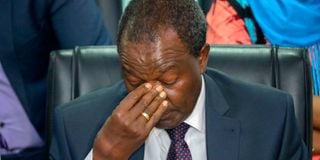Premium
3pm: Njuguna Ndung'u’s defining moment for Kenyans in Parliament

National Treasury and Economic Planning Cabinet Secretary Njuguna Ndung’u when he appeared before members of the Senate Committee on County Public Investments and Special Funds at the Kenyatta International Convention Centre in Nairobi on April 24, 2023.
At 3pm on Thursday, Treasury Cabinet Secretary Njuguna Ndung'u will make the short journey from the National Treasury building to Parliament to present the first budget under the Kenya Kwanza administration.
The omnibus budget, estimated at Sh3.599 trillion and the largest in Kenya's history, will outline the government's spending plans for the financial year starting July 1.
President William Ruto plans to spend an additional Sh240.7 billion more than his predecessor, whose last budget totalled Sh3.359 trillion before subsequent amendments (supplementary budget).
The new government is relying on higher revenues than the previous administration, with total revenues expected to rise by more than Sh431 billion to Sh2.894 trillion from an estimate of Sh2.529 trillion at the start of the last financial year.
Ordinary revenue, which represents collections by the Kenya Revenue Authority (KRA), is estimated at Sh2.571 trillion compared to an estimate of Sh2.146 trillion last year, reflecting a projected increase in tax revenue of Sh425.1 billion.
Meanwhile, projections for receipts from ministries, known as ministerial allocations in aid, are largely unchanged from previous estimates, at Sh332.5 billion compared to Sh320.8 billion.
Kenya's Kwanza administration will support new tax policy measures to boost revenue collection, including the implementation of the country's first national tax policy based on certainty and consistency in tax legislation and management of tax expenditure.
Technology to cover the integration of the KRA's tax systems and those of taxpayers will also support revenue and tax reforms, with the tax authority having already linked its systems to those of gaming companies in early June.
"By leveraging on the automation of systems for all key government entities, integrating the KRA's tax systems with critical government systems to enable seamless information sharing for a 360-degree view of taxpayers' economic transactions, and enhancing the KRA's capacity in big data analytics to drive compliance interventions," the National Treasury said in its budget summary for the 2023-24 financial year.
On the expenditure side, the new administration has increased spending across the board as the government takes its first stab at implementing its much-publicised bottom-up economic transformation agenda.
The agenda focuses on reducing the cost of living, increasing employment, improving social security, broadening the tax base to generate more revenue and achieving a more equitable distribution of income.
The transformation of agriculture, micro, small and medium enterprises, housing and settlements, healthcare and creative industries have been highlighted as key focus areas for the new government.
In contrast, President Uhuru Kenyatta's last budget sought to focus on the then-big four drivers and enablers — supporting manufacturing to create jobs, improving food security, providing universal health coverage and affordable and decent housing.
Dr Ruto's first budget will outline key expenditure reforms aimed at improving the efficiency of public spending, including eliminating non-priority spending, phasing out expensive and unsustainable consumption subsidies and increasing the use of public-private partnership financing for commercially viable projects.
Recurrent spending in Ruto's first full budget is expected to increase by Sh206.6 billion to Sh2.478 trillion, while development spending is set to increase by Sh12.5 billion to Sh689.1 billion.
Transfers to counties are set to increase by Sh22.7 billion, including Sh385.4 billion in equitable sharing and Sh44.3 billion in conditional transfers.
Borrowing
In a departure from the previous government, the new administration has projected a rare reduction in borrowing as it relies on higher revenue collection to meet its spending needs.
The fiscal balance after grants, which represents the fiscal deficit or financing requirement, has shrunk to Sh663.5 billion from Sh862.9 billion previously.
Subsequently, net external borrowing is expected to fall to Sh131.5 billion from a higher target of Sh280.7 billion in June last year.
By the same measure, domestic borrowing excluding debt repayments is expected to fall by Sh50.2 billion to Sh532 billion from Sh582.2 billion previously.
The new government has outlined plans to prioritise funding from cheap external sources such as the International Monetary Fund and the World Bank to manage the cost of borrowing over its term.
"The government will maximise the use of official external sources for loans on concessional terms, while non-concessional or commercial external borrowing will be limited to projects with high financial and economic returns in line with the bottom-up economic transformation agenda," the Treasury added.
"These sources will be diversified by the government maintaining its presence in the international and domestic capital markets, including exploring green and climate change financing options."





